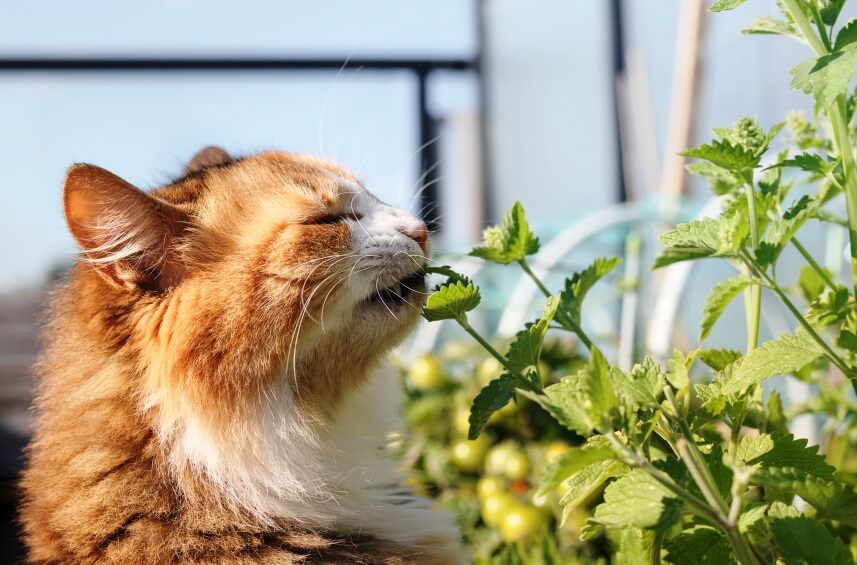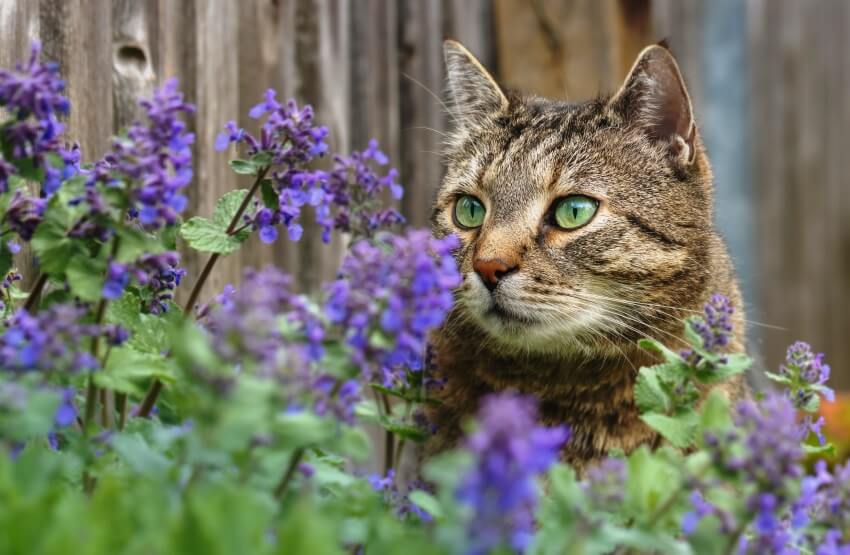In the realm of plants, one stands out for its charm and surprising benefits: catnip plant. While famous for its playful effects on cats, catnip isn’t just a source of feline amusement. This aromatic herb has hidden perks for both our pets and us. From bringing joy to our furry friends to offering potential health boosts, catnip proves that nature has delightful surprises that benefit not only our pets, like cats and dogs, but also us humans. This essay explores benefits of catnip (Nepeta Cataria) and also the ways which this plant contributes to the well-being of both pets and people.
If you are interested in this topic, you can also read
<<Chameleon Plant Benefits>> and <<Cistanche Health Benefits>> articles.
About Catnip
Catnip’s introduction to North America dates back to the 1800s, When European settlers used it as a culinary herb. Beyond its culinary role, catnip has a rich history of medicinal use, particularly for children experiencing colic, stress, and stomach aches. While there’s internet speculation about ancient Egyptians introducing catnip to cats, there’s no documented evidence to support this claim.
The endearing names “catnip” and “catmint” are not arbitrary choices but are deeply rooted in the fascinating behavior of approximately two-thirds of cats towards this herb. Catnip’s captivating effects on feline behavior are attributed to the presence of nepetalactone, a unique oil found within the leaves of the catnip plant. This compound not only affects domestic cats but also resonates with various members of the cat family, including leopards, cougars, servals, and lynxes. Even larger species like lions and tigers may exhibit strong reactions, although not consistently. Despite this wide-ranging influence, around one-third of cats, domestic or otherwise, remain unaffected by catnip, showcasing a hereditary aspect to this intriguing behavior [1].
Catnip Benefits For Cats
For domestic cats, catnip serves as a recreational substance, bringing joy to pet cats. Catnip-infused products are available for consumers, providing entertainment for our furry companions. When cats encounter bruised catnip leaves or stems, they exhibit a range of behaviors, including rubbing, rolling, pawing, licking, and chewing.
Excessive consumption leads to drooling, sleepiness, anxiety, leaping, and purring. Some cats may growl, meow, scratch, or bite at the hand holding the catnip. This unique response typically lasts between 5 and 15 minutes, after which olfactory fatigue sets in. Notably, the vomeronasal gland, an extra scent organ in a cat’s mouth, plays a crucial role in processing these scents and transmitting them to the brain.
Nepetalactone, the oil responsible for these behavioral changes, functions by mimicking feline sex hormones. Cats exposed to catnip often display behaviors resembling those of a female cat in heat, regardless of their gender. These behaviors range from overt signs of affection, relaxation, and happiness to more active behaviors like playfulness or occasional aggression. Remarkably, catnip can serve as a natural stress reliever, potentially reducing anxiety and even alleviating pain in cats [2].
Catnip Benefits For Dogs
Even though it’s called catnip, this plant is actually safe and harmless for dogs. Catnip is packed with useful stuff like magnesium, vitamins C and E, tannins, and flavonoids. Plus, it has essential oils that can keep a dog’s stomach healthy and ease any tummy troubles. If your dog gets anxious, whether it’s a vet visit or a noisy holiday, catnip can be like a natural chill pill for them. The special ingredients in catnip have a diuretic effect, helping dogs get rid of extra water and flush out waste. Catnip’s oils are also good for a dog’s digestion, preventing gas and indigestion. Thanks to a chemical called nepetalactone, catnip acts like a snooze button for dogs, calming nerves and promoting better sleep. It even has antibacterial properties, making it handy as a natural antiseptic for small cuts.
To tap into all these benefits, you can sprinkle a bit of dried catnip on your dog’s food or add a few fresh leaves to their water. Just be sure to talk to your vet first, especially if your dog has health issues. Catnip toys, usually made for cats, can also work wonders to soothe your dog’s nerves before a trip to the vet –make sure to choose a bigger toy to avoid any choking hazards [3, 4].
Catnip Benefits For Humans
Catnip isn’t just aromatic; it’s a medicinal wonder too, with compounds like nepetalactone, thymol, and pinene. If you dry catnip and make tea, the hot water brings out these compounds, and as you sip your tea, you will get a dose of both the aroma and the health benefits. Here are some health benefits of catnip:
Rich In Antioxidants
Catnip is like a powerhouse of antioxidants, such as flavonoids and phenolic acids, like Caffeic acid, Rosmarinic acid, and Coumaric acid. They’re like the superheroes that protect our cells from damage caused by free radicals. Studies even say that rosmarinic acid, found in catnip, is a stronger antioxidant than vitamin E! This not only lowers the risk of things like cancer and atherosclerosis but can also help treat stomach ulcers and asthma. In fact, a cup of tea of catnip is like a nature’s own antioxidant-rich brew.
Better Sleep
The magic of catnip tea lies in its ability to calm the body, especially before bedtime, promoting a good night’s rest. The secret behind this calming effect is catnip’s special compounds, nepetalactone, and nepetalactone acid. These compounds are like the calming ingredients found in valerian, a well-known herbal sedative. So, when you sip on catnip tea, it’s like sipping on a natural mood booster that can help ease anxiety, restlessness, and nervousness. It’s nature’s way of bringing a sense of calm and tranquility to your evening routine.
Good For Digestive System
In the pages of history, catnip has long been a go-to remedy for issues like diarrhea, gas, and stomach cramps. People believed it could work wonders by easing muscle spasms in the intestinal tract. So, sipping on a cup of catnip tea wasn’t just a pleasant ritual; it was a way to bring comfort to the digestive system. The soothing qualities of catnip were trusted to calm tummy troubles and bring relief to those in need.
Good For Women’s Health
Catnip tea has a unique ability to stimulate uterine contractions, which can be helpful for women or girls experiencing delayed menstruation, aiding in the onset of periods. Additionally, it may assist in the expulsion of the placenta after childbirth. However, it’s crucial to note that pregnant women should avoid catnip tea, as it can induce uterine contractions that may lead to premature labor.
Furthermore, for women with conditions like pelvic inflammatory disease (PID) or heavy menstruation, catnip tea is not recommended, as it has the potential to exacerbate these symptoms and even cause an earlier onset of menstruation. It’s always important to be cautious and consult with a healthcare professional before incorporating catnip tea into one’s routine, especially during pregnancy or if there are pre-existing health conditions [5].
Other Catnip Benefits For Humans
Nepetalactone, found in catnip, serves as a natural mosquito and fly repellent. The oil extracted through steam distillation is particularly effective against insects like mosquitoes, cockroaches, and termites. Beyond its use in the garden, catnip has a multitude of benefits, ranging from flavoring stews and sauces to serving as a rich source of Vitamin C [6].
Possible Side-Effects Of Catnip
Here are some potential side effects of using catnip [7]:
- Combining catnip tea with sleeping medication can lead to excessive drowsiness, making it less than ideal for consumption at the beginning of a workday.
- Some individuals may experience an upset stomach after drinking catnip tea, despite its use by others to relieve digestive problems. If persistent stomach discomfort occurs, it’s advisable to discontinue catnip tea consumption.
- Both adults and children may vomit if too much catnip tea is consumed. Individuals allergic to other plants in the mint family could also experience an allergic reaction to catnip.
- Despite marketing claims suggesting catnip tea as a remedy for colic and morning sickness, it is recommended for infants and pregnant individuals to avoid catnip due to potential interactions.
- Catnip, being a sedative herb, may also interact with certain medications, including anticonvulsants, barbiturates, benzodiazepines, tricyclic antidepressants, over-the-counter cough and cold medications containing diphenhydramine or doxylamine, and insomnia drugs.
- It’s essential to exercise caution and consult with a healthcare professional, especially if combining catnip tea with medications.
How To Make Catnip Tea
Making catnip tea is a simple process. Just combine 2 teaspoons of dried catnip leaves or flowers with 1 cup of boiling water. Enhance the flavor with a touch of lemon juice and honey, give it a good stir, and allow it to cool for a few minutes. Many find a steeping time of around 10 to 15 minutes to be just right.
Catnip tea boasts a woodsy, almost grassy taste. As it sits with lemon, the natural minty and citrusy undertones become more pronounced. Some individuals even prefer letting the tea sit for a while before sipping, savoring the evolving flavors that develop over time. Enjoying a cup of catnip tea is not just about the benefits it brings but also about appreciating the unique and evolving taste experience it offers.











